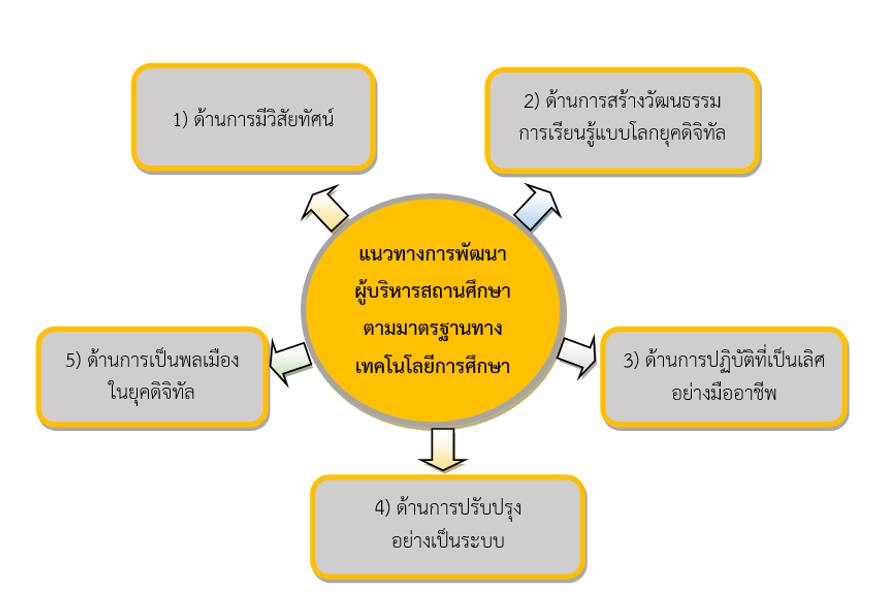GUIDELINES FOR SCHOOL ADMINISTRATOR DEVELOPMENT BASED ON EDUCATIONAL TECHNOLOGY STANDARD UNDER ROI ET SECONDARY EDUCATIONAL SERVICE AREA OFFICE
Main Article Content
Abstract
This research aimed to study the current situation, desired conditions, and needs for the educational technology standard of the school administrator, and examine the guidelines for school administrator development based on the educational technology standard of the school administrator. The research was divided into two phases. The first phase was the study of the current situation, desired conditions, and needs for the educational technology standard of the school administrator. The second phase was the study of the guidelines for school administrator development based on the educational technology standard of the school administrator. The sample group was a total of 331 school administrators and teachers, and the five targets of the study on the guidelines for school administrator development based on the educational technology standard of the school administrator under Roi Et Secondary Educational Service Area Office. The questionnaire, interview form, and guidelines assessment form were used to collect the data. Statistics used included the percentage, mean, Standard Deviation, correlation coefficient, Cronbach's alpha coefficient, PNI Modified, and content analysis.
The results showed that: 1) Personnel participative administration of academic affairs in the New Normal Age to improve the quality of school learners in Thung Kula Thong Consortium under the Secondary Educational Service Area Office Roi Et, in overall was found to stand at the ‘MUCH’ level. Taking into account the individual aspects, it was found that the item that featured the highest average was in the aspect of measurement, evaluation, and conducting comparisons for transferring academic results in the development of learning processes Media development and use of media technology for education curriculum development of school and research to improve the quality of education in school, respectively. And 2) The comparison of the opinions of teachers and educational personnel of the so-said schools, classified by gender, age, and work experience was found to show no statistically significant difference.
Article Details

This work is licensed under a Creative Commons Attribution-NonCommercial-NoDerivatives 4.0 International License.
References
กระทรวงดิจิทัลเพื่อเศรษฐกิจและสังคม. (2560). รายงานประจำปีกระทรวงดิจิทัลเพื่อเศรษฐกิจและสังคม. กรุงเทพมหานคร : กระทรวงดิจิทัลเพื่อเศรษฐกิจและสังคม.
กระทรวงศึกษาธิการ. (2562). พระราชบัญญัติการศึกษาแห่งชาติ พุทธศักราช 2542 (ฉบับที่ 4). กรุงเทพมหานคร : บริษัท สยามสปอรต์ ซินดิเคท จำกัด.
จุฬาลักษณ์ อังษรณรงค์. (2561). ปัจจัยที่ส่งผลต่อภาวะผู้นำเชิงเทคโนโลยีสารสนเทศของผู้บริหาร สถานศึกษา สหวิทยาเขตหนองหาน สังกัดสำนักงานเขตพื้นที่การศึกษามัธยมศึกษา เขต 20 จังหวัดอุดรธานี. วิทยานิพนธ์ศึกษาศาสตรมหาบัณฑิต สาขาวิชาการบริหารการศึกษา. วิทยาลัยบัณฑิตเอเซีย.
ชัญญาภัค ใยดี. (2561). การศึกษาแนวทางการพัฒนาภาวะผู้นำด้านเทคโนโลยีของผู้บริหารสถานศึกษา สังกัดองค์การบริหารส่วนจังหวัดนครราชสีมา. วารสารดุษฎีบัณฑิตทางสังคมศาสตร์. 8(1). 150-164.
ดวงเดือน ตั้งประเสริฐ. (2557). การศึกษาปัจจัยที่มีอิทธิพลต่อภาวะผู้นำเชิงเทคโนโลยีสารสนเทศและการสื่อสารของผู้บริหารสถานศึกษาขั้นพื้นฐานระดับมัธยมศึกษา ในจังหวัดนครราชสีมา. วิทยานิพนธ์ครุศาสตรมหาบัณฑิต. บัณฑิตวิทยาลัย : มหาวิทยาลัยราชภัฏนครราชสีมา.
ทินกร บัวชู, และทิพภาพร บัวชู. (2562). ภาวะผู้นำดิจิทัลของผู้บริหารสถานศึกษา. เพชรบุรี : มหาวิทยาลัยราชภัฏเพชรบุรี.
นิศาชล บำรุงภักดี. (2563). ความสัมพันธ์ระหว่างภาวะผู้นำทางเทคโนโลยีสารสนเทศของผู้บริหารสถานศึกษากับประสิทธิผลโรงเรียน ในสังกัดองค์กรปกครองส่วนท้องถิ่นจังหวัดสกลนคร. วิทยานิพนธ์ศึกษาศาสตรมหาบัณฑิต สาขาวิชาการบริหารการศึกษา. บัณฑิตวิทยาลัย : มหาวิทยาลัยราชภัฏสกลนคร.
บุญชม ศรีสะอาด. (2560). การวิจัยเบื้องต้น. พิมพ์ครั้งที่ 9. กรุงเทพมหานคร : สุวีริยาสาส์น.
ปอส์ ไกรวิณณ์. (2560). กลยุทธ์การพัฒนาผู้บริหารโรงเรียนเอกชนตามแนวคิดความเป็นพลเมืองดิจิทัล. วิทยานิพนธ์ปริญญาปรัชญาดุษฎีบัณฑิต สาขาวิชาการบริหารการศึกษา. บัณฑิตวิทยาลัย : มหาวิทยาลัยจุฬาลงกรณมหาวิทยาลัย.
ภาคภูมิ งอกงาม. (2556). การศึกษาคุณลักษณะภาวะผู้นำเชิงอิเล็กทรอนิกส์ของผู้บริหารระดับกลางโรงเรียนในฝันจังหวัดอ่างทอง. วิทยานิพนธ์ศึกษามหาบัณฑิต สาขาวิชาการบริหารการศึกษา. บัณฑิตวิทยาลัย : มหาวิทยาลัยศรีนครินทรวิโรฒ.
สำนักงานเขตพื้นที่การศึกษามัธยมศึกษาร้อยเอ็ด. (2564). แผนปฏิบัติการประจำปีงบประมาณ2564. ร้อยเอ็ด : สำนักงานเขตพื้นที่การศึกษามัธยมศึกษาร้อยเอ็ด.
อุรุดา สุดมี, มลิวัลย์ ธรรมแสง และเรณุมาศ กุละศิริมา. (2558). รูปแบบการพัฒนาภาวะผู้นำด้านเทคโนโลยีเพื่อการศึกษาของผู้บริหารสถานศึกษาเฉพาะความพิการ. วิทยานิพนธ์ศึกษาศาสตรดุษฎีบัณฑิต สาขาการบริหารการศึกษาพิเศษ. บัณฑิตวิทยาลัย : มหาวิทยาลัยราชภัฏสวนดุสิต.
Arican Institute for Research: AIR. (2014). Evaluation of the school technology leadership initiative: external evaluation report #2. Washington, DC : American Institutes of Research.
Cakir, M. (2013). Constructivist Approaches to Learning in Science and Their Implications for Science Pedagogy: Literature Review. International Journal of Environmental and Science Education. 4(3). 193-206.
International Society for Technology in Education(ISTE). (2009). National Educational Technology standards for administrators. Washington, DC : Eugene, QR.


